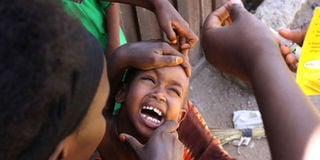Country staring at health crisis as children miss vaccination

Polio vaccination at Kambi Odha in Isiolo County on January 18, 2017. Polio is an infectious disease caused by a virus that lives in the throat and intestinal tract. PHOTO | PHOEBE OKALL | NATION MEDIA GROUP
What you need to know:
- Out of every 1,000 children, 39 die due to diseases that can be prevented by vaccination.
- The national immunisation coverage dropped from 85 to 68 per cent due the five months nurses' strike.
Elizabeth Auma’s baby was six-months-old and was due for a polio vaccine when nurses went on strike.
So like 499,999 other mothers with young children, Ms Auma had to wait for three months until the nurses got back to work for the children to receive the lifesaving vaccines.
Vaccination, especially that of babies, is a religiously followed routine in most Kenyan families.
Important as it is, however, vaccination is often made difficult by conflicting information, influences from organisations and lately, access to the very services.
Out of every 1,000 children, 39 die due to diseases that can be prevented by vaccination.
POLIO SPREAD
Polio is an infectious disease caused by a virus that lives in the throat and intestinal tract.
It is most often spread through contact with the stool of an infected person and may also be spread through oral and nasal secretions.
People should get polio vaccine when they are young.
Children get four doses of inactivated poliovirus vaccine (IPV) at these ages: two months, four months, six to 18 months, and a booster dose at four to six years.
DISEASES
Ms Auma’s child is turning 12 months next week but she is afraid of the consequences that might follow if there is an outbreak of any disease in the country since he has not been given vaccinations that he missed.
At six months, Ms Auma’s baby ought to have been vaccinated against flu and given Vitamin A.
At seven he was to get the second dose of flu vaccine. At nine, Measles and Yellow fever vaccine and the first dose of chickenpox vaccine.
He was also to be vaccinated against Meningitis. At 11 months, he was to get the second dose of chicken pox.
PUBLIC HOSPITALS
These vaccines, according to the country’s immunisation framework, ought to be given at the scheduled ages if they are to effectively work.
But 44 days since nurses resumed duty, Ms Auma’s child is yet to given the vaccines that he missed.
“I went to the hospital and requested if my son could be given the vaccination that he missed but the nurse in charge told me that the vaccines were not enough and that if all the mothers would request the same, then no child would get the current vaccination,” Ms Auma says.
“If I had the money, I would have gone to a private facility.”
STRIKE
Ms Auma’s child represents more than 5,000 other children in Kisumu County that may have missed their vaccination during the nurses’ strike exposing them to preventable diseases.
Among the vaccines many children below five years may have missed include tuberculosis, polio, and measles, Kisumu Director of Health, Dickens Onyango, says.
To mitigate the effects of the health workers’ strike, Dr Onyango said the county had distributed drugs that were stocked in public hospitals to private facilities to offer free immunisation to children.
“It is seems most mothers were not aware of this. Those who missed immunisation can still get them in public hospital across the county.”
He said no mother should let their children skip immunisation since they would be risking their lives.
“We are keen to prevent childhood illnesses that previously resulted in millions of deaths and disability globally,” he said.
HEALTH
Since the government is not sure whether thousands of children who missed their vaccination were getting them in public facilities, the country is staring at a huge health crisis and the disease profile in the country is likely to be affected, for the worse.
When a child misses a polio vaccine and there is an attack, for instance, the likelihood of that child going down with the virus is huge.
The World Health Organization recommends an oral polio vaccine dose immediately a baby is born called a zero dose followed by a series of three primary doses and one minimum inactivated dose.
“Vaccines are the safest way to protect children and pregnant mothers from a long list of serious and potentially life-threatening illnesses,” Dr Walter Otieno, a Western Kenya based paediatrician, says.
“They protect children by preparing their immune systems to recognise and fight serious, deadly diseases.”
IMMUNISATION
The children were not vaccinated against some of the world’s most debilitating diseases, including polio, pneumonia, meningitis, measles, influenza, and hepatitis.
These diseases, long identified as among the biggest health threats in the region, could ravage the nation in the coming years if these hordes of vulnerable children are exposed to their vectors.
For health experts, it is hard to fathom the gravity of the situation.
According to the data from the Ministry of Health released in October, the national immunisation coverage dropped from 85 to 68 per cent due the five months nurses' strike.
The data also indicated that the number of children who were not vaccinated rose from 157,584 to 265,523 between January and July, exposing Kenya to the risk of diseases such as polio, pneumonia, and tuberculosis.
CAMPAIGN
From the statistics, skilled care during pregnancy declined by 44 per cent while deliveries in health facilities reduced by 28,000 from 85,000 between January and July.
This means that new mothers have been unable to get services such as immunisation and regular check-ups in public hospitals.
With the worrying statistics, the government launched a campaign targeting 300,000 children below five years who missed out on six essential vaccines.
The drive which was rolled out in 11 counties targeted polio, tetanus, measles, BCG, influenza and pneumonia.




